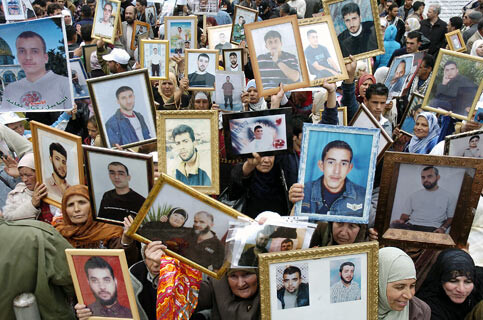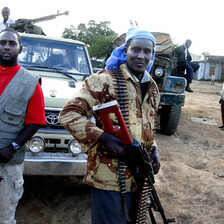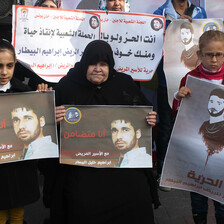The Electronic Intifada 16 July 2006

Palestinians hold up photos of imprisoned relatives during a rally to mark Prisoners Day in the West Bank town of Ramallah, April 17, 2006. (MaanImages/Mushir Abdelrahman)
They have trouble leaving the house. People talk. Visitors come to bear condolences, gifts, dishes, grocery goods. But they really come to ask, laysh heyk (why is this)? When they go out, it’s all the same. People and their questions.
The lawyer hasn’t come yet, and it has been five days now. Their only information is from Nadi al-Aseer, or the Prisoners’ Group, as it is called for short. Nadi al-Aseer knows nothing yet. Until when, whispers through their rooms.
For several days, this family has been without their daughter, who vanished one midnight after a band of Israeli soldiers kicked in the door. The family has asked that their names remain anonymous, that the town they live in not be revealed. This could be Imneizel, Tulkarem or Rafah; the West Bank or Gaza Strip. Their daughter is young, but how young cannot be revealed, nor can the village rumors surrounding her abduction. Erring on the side of careful is a complicated science. It demands a silence more pregnant than this tiny apartment can stand.
What they will say is that the soldiers came at 12:30am, and asked all the family to vacate the flat except the daughter. As the family stood outside, neighbors across the street saw the soldiers through the windows tearing the home’s two rooms apart. The daughter sobbed as they hammered her in feckless Arabic for the next hour. The last anyone saw of her was a silhouette in the bullet proof window of an Israeli armored personnel vehicle.
The mother will tell us that she knows her daughter is innocent, that she had never been mixed up in politics. Mothers often say these things, but such words are grounded in desperation, resilience, at worst, denial. This mother has not inhabited herself for days. The amputation was too sudden, the volume of loss perhaps too incomprehensible to bother convincing an outsider of her injustice.
Before that night, her daughter was suffering from a pain here, she says, caressing her own shoulder. We never knew from what, or how bad it was. It may or may not be bothering her now. Maybe this is the least of her pains, maybe the worst, she says. She continues rubbing her shoulder, staring beyond us. Maybe anything.
They say that when one loses an appendage, the sensation never leaves. One is visited by a “referred pain”. Since 1967, when Israel occupied the West Bank and Gaza, approximately one third of all Palestinians have, at one time or another, languished in Israeli prisons, contributing to a vacuum in family life. Today, as Israel and the United States use the capture of three Israeli soldiers to justify civilian massacres in Gaza and Lebanon, nearly 9,000 Palestinians are held in Israel’s detention facilities. Of these, 126 are women and 388 are children below the age of 18, according to the Prisoners’ Group and Defense of Children International (DCI).
In a recent article in the Washington Post, Scott Wilson compared the Palestinian prison experience to that of Israelis who are required to fully enlist in the military — three years for men and about two for women. Given that there are certain exceptions to who serves in Israel’s military, such as Orthodox Jews (for whom it is optional) and Palestinians with Israeli citizenship, Wilson’s comparison, in terms of mandatory rite of passage, is nearly proportionate.
However different the two experiences may be, they are essential to one another’s existence. According to a reservist in the Israeli army, which calls itself the Israeli Defense Force (IDF), soldiers are given little to no protocol when it comes to administering checkpoints or carrying out midnight abductions. “Our commanders are usually satisfied enough if they can convince us that we are ‘the only thing that stands between peace and terrorism,’” the reservist said. “It does a number on the psyches of 19-year-old conscripts. They don’t deserve that kind of manipulation.”
Nor do the Palestinians who are subjected to the panicked whims of young soldiers.
According to Abdullah of the Palestinian Prisoners’ Society, the “Prisoners’ Group” that advocates for families like the one mentioned above, many of Israel’s late night “arrests” are in fact clean-up operations from a previously bungled one. For instance, when a Palestinian is killed in a skirmish or by “accident”, as the IDF often alleges, the next step in “securing the peace” is to detain anyone with close relations to the deceased. Yet these administrative detentions follow a distinct Foucauldian pattern: As frustration and desperation among Palestinians sublimate into anger and retribution, collateral damage and human rights abuses become more excusable (although a certain degree of racism affords this excusability). In this regard, the Israeli occupation is perhaps the most successful “security” project in existence, not because it prevents abuses from happening, but because it reproduces and contains them in an exclusive space.
But there is little room for maneuvering in these spaces, says Abdullah. While the Prisoners’ Group has formed reliable social networks and a team of lawyers to address these cases, the frequency of arrests and dearth of information render their work impractical. “After 24 hours we should know where an administrative detainee is being kept,” says Abdullah, “but this can go up to two weeks or even a month.”
After the lawyer ascertains the detainee’s whereabouts, he first establishes the prisoner’s health status, as torture or beatings are commonplace in administrative detentions. At times, up to two years can pass before the lawyer sees the prisoner through to trial, and even then there is no clear distinction between the deliberations of judges and Israeli intelligence operatives. And for Prisoner Group advocates, there is little clarity on what defines success, beyond giving the detainee’s family a straight answer.
To that end, Abdullah has countless anecdotes of family severances — mother from daughter, brother form brother, children from breadwinners — and none are any less tragic than their counterparts. As essential a network the Prisoners’ Group may be, it is the last social club in Palestine a family wants to join. The family that opened this article is not the most recent members of the Prisoners’ Group, and they may yet be joined by many more before they know where their daughter is.
Until then, the family stays at home and waits for word from a lawyer. The mother clings to what may be her only certainty. “I know my daughter,” she says, “but I also know the meaning of Israeli law.”
Zachary Wales is a regular contributor to Electronic Intifada.
Related Links





